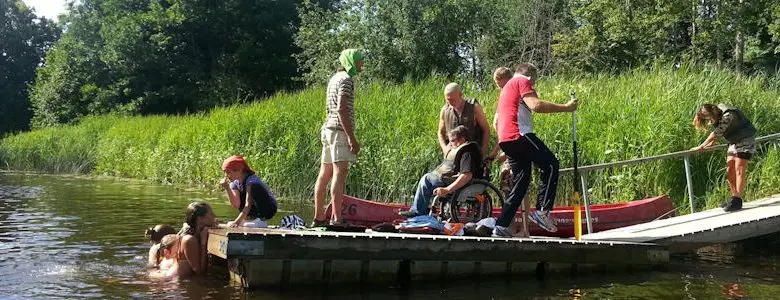
New accessible travel guide from Responsible Travel
New accessible travel guide from Responsible Travel encourages tourists to get adventurous. The first sentence sets the scene for this new online guide from Responsible Travel; “In many ways we don’t want to give this guide a name. Because tourists who have accessibility issues are probably tired of being put in a box. Or a bracket. Such as (wheelchair users welcome).” Blowing these brackets and boxes wide open is exactly what this guide intends to do.
With ideas on where to go and how to have a more inspirational holiday experience, the guide encourages travellers to expand their horizons, and push traditional boundaries when planning a trip. Local and accessible tourism experts, including Disability Horizons’ Martyn Sibley, have lent their voice to the tips and advice in the guide.
Martyn says
“My top tip is, no matter who you are, whatever your perceived limits are, just do it! It might take a lifetime of planning, but you can get there. And that is my next tip – decide where you want to go and what you want to do when you get there. Don’t let your disability plan that for you. “
“Choosing the right accommodation and knowing that they have been able to answer all your questions, is fundamental. After that I recommend pushing your boundaries just a bit. I am a bit of an adventurer, and been lucky enough to fly a plane, abseil, scuba dive, hot air balloon and so much more. But you don’t have to do all that straight away. Take baby steps and get braver with each trip, or on each day of your trip even. Just don’t go stale because others say its best and safe.”
The guide also has some useful advice for disabled travellers on how they can help hoteliers and tour operators respond more openly, and helpfully to tourists with accessibility needs. Chris Veitch, an accessible and inclusive tourism consultant says “Guests have a responsibility to be upfront about what their requirements are. They can’t expect businesses to be mind readers either. Sometimes it is low cost things that make all the difference, but unless businesses know that, they won’t invest in them”.
And Responsible Travel also argues that understanding accessibility needs will ultimately be better for the tourism industry as a whole. Recent research shows that the European travel industry is still missing out on as much as €142 billion due to insufficient services and in the UK alone two-thirds of businesses and attractions are not accessible causing a loss of £2 billion-a-year.
So what has sparked Responsible Travel’s commitment to inclusive tourism? The World Responsible Tourism Awards, founded by Responsible Travel in 2004 and held at the prestigious World Travel Market in London, has become a major landmark of the travel industry calendar.
The first ever category for accessible tourism was introduced last year and proved to be a momentous success, with the winners of the category, Campo & Parque Dos Sonhos, not only winning their own category but also going on to become joint-overall winners of the entire awards. Commenting on this, Awards founder and managing director of Responsible Travel, Justin Francis, says:
“When Campo & Parque Dos Sonhos, an inspirational and inclusive Brazilian adventure park, was announced as the joint-overall winner of the 2014 World Responsible Tourism Awards at WTM it sent a clear signal to the responsible tourism industry that we need to do more to encourage and develop inclusivity.
Our new guide aims to inspire both disabled travellers and the tourism industry to be braver and to break down barriers to understanding accessibility needs. As a site we know we have a long way to go to offering truly inclusive tourism, and we hope this guide is just a starting point for a process of positive change.”
The guide was sponsored and informed by the Catalan Tourist Board, which has managed to make Catalonia one of the most accessible tourist destinations in the world thanks to the success of the implementation of its ‘Tourism for All’ scheme. A spokesperson from the Catalan Tourist Board said:
“Accessible tourism must be based on the principle that tourism is a fundamental social right for all, since for people with disabilities or reduced mobility and for everyone, the activities included under the categories of tourism and leisure are key to enjoying quality of life.”
The full guide, including a range of accessible holidays, from safaris in Tanzania to cycling in Catalonia can be found at Responsible Travel.
By Sarah Bareham
Tell us about your travels by messaging us on Facebook, tweeting us @DHorizons, emailing us at editor@disabilityhorizons.comor leaving your comments below.
If you’re planning your next holiday, why not visit our new travel site, Accomable, to find accessible accommodation not just in the UK, but across the world.